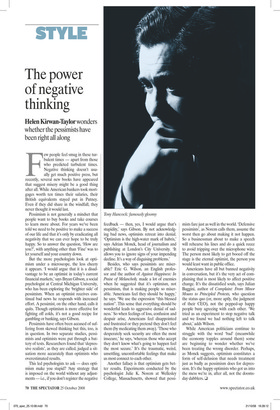The power of negative thinking
Helen Kirwan-Taylor wonders whether the pessimists have been right all along Few people feel smug in these turbulent times — apart from those who predicted turbulent times. Negative thinking doesn’t usually get much positive press, but recently, several new books have appeared that suggest misery might be a good thing after all. While American bankers took mortgages worth ten times their salaries, their British equivalents stayed put in Putney. Even if they did share in the windfall, they never thought it would last.
Pessimism is not generally a mindset that people want to buy books and take courses to learn more about. For years we’ve been told we need to be positive to make a success of our life and that it’s only by eradicating all negativity that we can ever hope to be truly happy. So to answer the question, ‘How are you?’, with anything other than ‘Fine’ was to let yourself and your country down.
But the more psychologists look at optimism under a microscope, the less cheery it appears. ‘I would argue that it is a disadvantage to be an optimist in today’s current financial markets,’ says Bryan Gibson, a social psychologist at Central Michigan University, who has been exploring the ‘brighter side’ of pessimism. When an optimist receives continual bad news he responds with increased effort. A pessimist, on the other hand, calls it quits. Though optimism is more effective for fighting off colds, it’s not a good recipe for gambling or banking, says Gibson.
Pessimists have often been accused of suffering from skewed thinking but this, too, is in question. In two separate studies, pessimists and optimists were put through a battery of tests. Researchers found that ‘depressive realists’, as they are called, judged a situation more accurately than optimists who overestimated results.
This led psychologists to ask — does optimism make you stupid? ‘Any strategy that is imposed on the world without any adjustments — i.e., if you don’t register the negative feedback — then, yes, I would argue that’s stupidity,’ says Gibson. By not acknowledging bad news, optimists retreat into denial. ‘Optimism is the high-water mark of hubris,’ says Adrian Monck, head of journalism and publishing at London’s City University. ‘It allows you to ignore signs of your impending decline. It’s a way of disguising problems.’ Besides, who says pessimists are miserable? Eric G. Wilson, an English professor and the author of Against Happiness: In Praise of Melancholy, made a lot of enemies when he suggested that it’s optimism, not pessimism, that is making people so miserable. ‘Americans feel they should be happy,’ he says. ‘We use the expression “this blessed nation”. This sense that everything should be wonderful leads to aggressive denial of sadness.’ So when feelings of loss, confusion and despair arise, Americans feel disappointed and frustrated or they pretend they don’t feel them (by medicating them away). ‘Those who desperately seek security are often the most insecure,’ he says, ‘whereas those who accept they don’t know what’s going to happen feel the most secure.’ It’s the traumatic, weird, unsettling, uncomfortable feelings that make us most connect to each other.
Another fallacy is that optimism gets better results. Experiments conducted by the psychologist Julie K. Norem at Wellesley College, Massachusetts, showed that pessi mists fare just as well in the world. ‘Defensive pessimists’, as Norem calls them, assume the worst then go about making it not happen. So a businessman about to make a speech will rehearse his lines and do a quick recce to avoid tripping over the microphone wire. The person most likely to get booed off the stage is the eternal optimist, the person you would least want in public office.
Americans have all but banned negativity in conversation, but it’s the very act of complaining that is most likely to affect positive change. It’s the dissatisfied souls, says Julian Baggini, author of Complaint: From Minor Moans to Principled Protests, who question the status quo (or, more aptly, the judgment of their CEO), not the pepped-up happy people busy agreeing with each other. ‘We tried as an experiment to stop negative talk and we found we had nothing left to talk about,’ adds Wilson.
While American politicians continue to struggle with the word ‘bad’ (meanwhile the economy topples around them) some are beginning to wonder whether we’ve been treating the wrong disorder. Perhaps, as Monck suggests, optimism constitutes a form of self-delusion that needs treatment just as badly as pessimism does for depression. It’s the happy optimists who got us into the mess we’re in, after all, not the doomsday dabblers. ❑


















































































 Previous page
Previous page